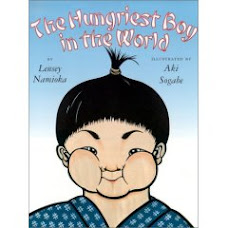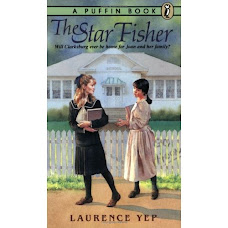BIBLIOGRAPHY
Smith, Cynthia Leitich. 2002. INDIAN SHOES. Illustrator Jim Madsen. HarperCollins; 1st edition ISBN-10: 0060295317 ISBN-13: 978-0060295318
SUMMARY
A selection of short interrelated stories of Ray and his Grandpa, of Seminole-Cherokee decent. Ray lives with his Grandpa Halfmoon in Chicago. Grampa reminisces about family and old times in Oklahoma. In the first story, Ray negotiates the trade for a pair of moccasins for Grandpa Halfmoon. In the last story, Ray and Grandpa visit family in Oklahoma. Ray discovers the reason Grandpa, a world class fisherman isn't catching any fish. We learn that Ray's dad is missing from Ray's life, and the stories, because he had died. Grampa Halfmoon is spending more time remembering his son that has died than fishing.
CRITICAL ANALYSIS
The short stories are interesting although they lack a conclusion. The stories leave you wanting more. In the stories, Grandpa is reminiscent of old times in Oklahoma. "Every once in a great while, my Gramps used to wear moccasins, instead of his cowboy boots," said Gramps "He use to pitch to me and my cousins too, and Gramps usually struck us out..." Shows the generations that have changed from the old ways to modern ways of life. After the conclusion of the trade of moccasins for hightops, the librarian displays Ray's hightops in place of the moccasins. A sign that reads, "traded from Ray Halfmoon, Cherokee-Seminole Hightops. Not Indian made but Indian Worn, Guaranteed" is displayed with the hightops. The use of the term, Indian, in the sign shows that the librarian is an outsider. The sign represents a degree of understanding but has an overhanging impression of stereotyping.
The many subtle references, reinforces the fact that Native Americans wear the same type of clothing and live in the same type of houses as everyone else, is an idea that needs to be understood by children. The stories show the close relationship between Ray and his Grandfather.
The illustrations are good representations of Native American lifestyle in the current day. Electric lights and a microwave are shown in the illustrations. Modern day clothing styles are worn by the characters. Uncle Leonard uses a laptop computer. These are items in the stories that are meant to convey an accurate representation of current lifestyles of Native Americans. In the illustrations, Grampa wears a ponytail that could represent his heritage. Caring for animals and fishing are important segments in the stories that represent closeness to nature that could relate to their heritage. Ages 4-8
REVIEWS
Publishers Weekly
Ray Halfmoon, a Seminole-Cherokee boy living with his grandfather in Chicago, is at the center of Smith's (Rain Is Not My Indian Name) slim collection of six tales. Though the author affectingly portrays the strong bond between grandson and grandfather, the narrative bogs down with flowery or overwritten passages (e.g., "Ray's and Grampa's breath puffed cloudy as they trudged next door to the Wang home. In the driveway, Mrs. Wang's VW Bug waited to be freed from the snow like a triceratops skeleton embedded in rock"). Kids may have trouble sticking with this collection. Ages 7-10. Copyright 2002 Cahners Business Information, Inc.
School Library Journal
Grade 3-5-Smith adds her voice to the precious few authors portraying realistic contemporary life for Indian children. Although she tells little of his background, the author uses six vignette chapters to introduce Ray, an affable mixed-blood Cherokee-Seminole boy living in Chicago with his Grampa Halfmoon. With humor, compassion, and ingenuity, . There are no mystical nature spirits or cathartic history lessons, only the everyday challenges common to any contemporary kid, as experienced by an Indian boy who is firmly grounded in his own family's heritage. With its unadorned portrayal of urban Indian life, Shoes is a good book for any elementary-aged reluctant reader, and a necessity for indigenous children everywhere.Sean George, St. Charles Parish Library, Luling, LACopyright 2002 Cahners Business Information, Inc.
CONNECTIONS
*Other books by Cynthia Leitich Smith
Smith, Cynthia Leitich. 2001. Rain Is Not My Indian Name. co author Lori Earley. HarperCollins; New York. ISBN-10: 0688173977 ISBN-13: 978-0688173975
Smith, Cynthia Leitich. 2000. Jingle Dancer. Cornelius Van Wright (Illustrator), Ying-Hwa Hu (Author). HarperCollins ISBN-10: 068816241X ISBN-13: 978-0688162412
*Talk about fishing with students, asking about their experiences. Have they lost someone in their family? Do they have a special memory that they would like to share?
Subscribe to:
Post Comments (Atom)







No comments:
Post a Comment